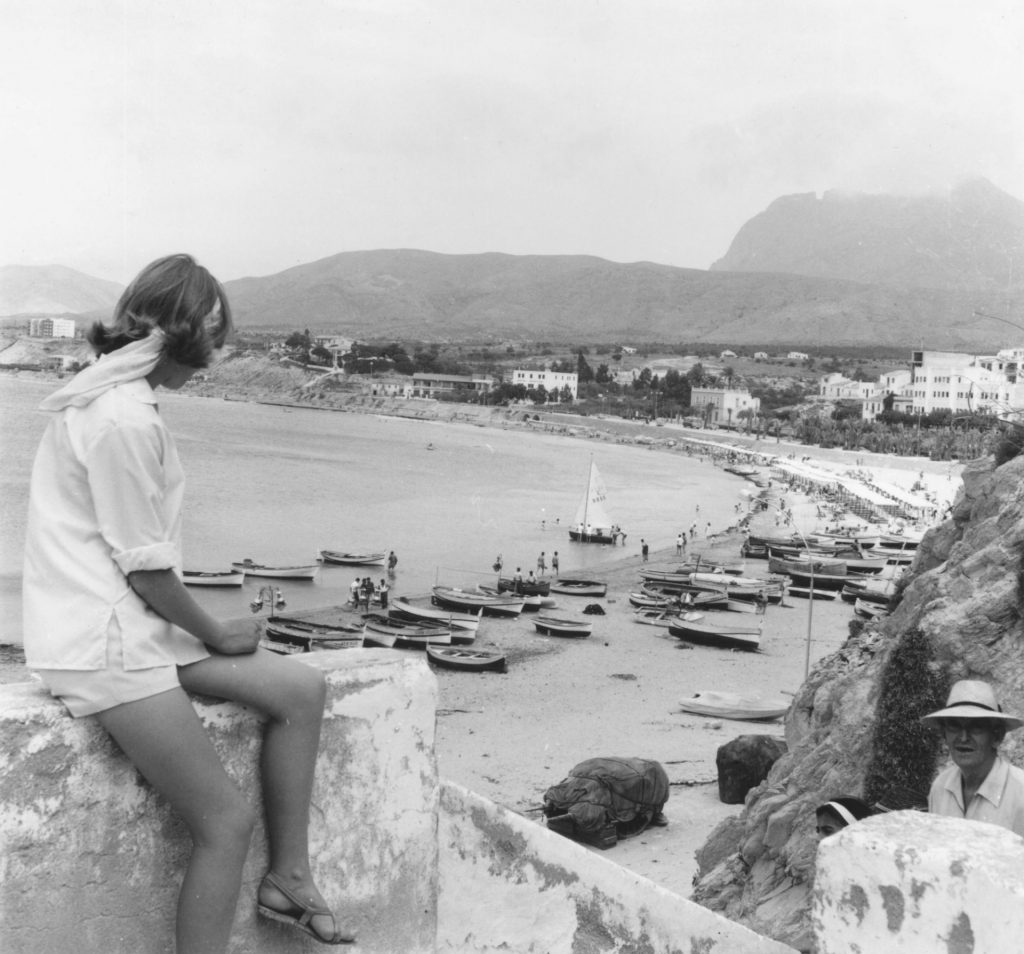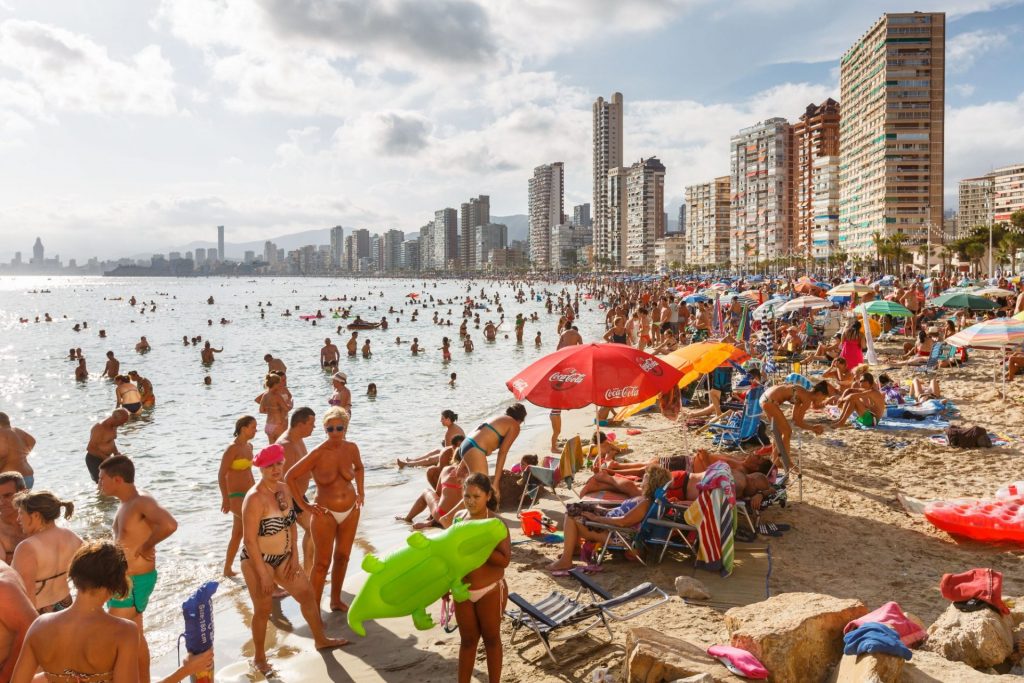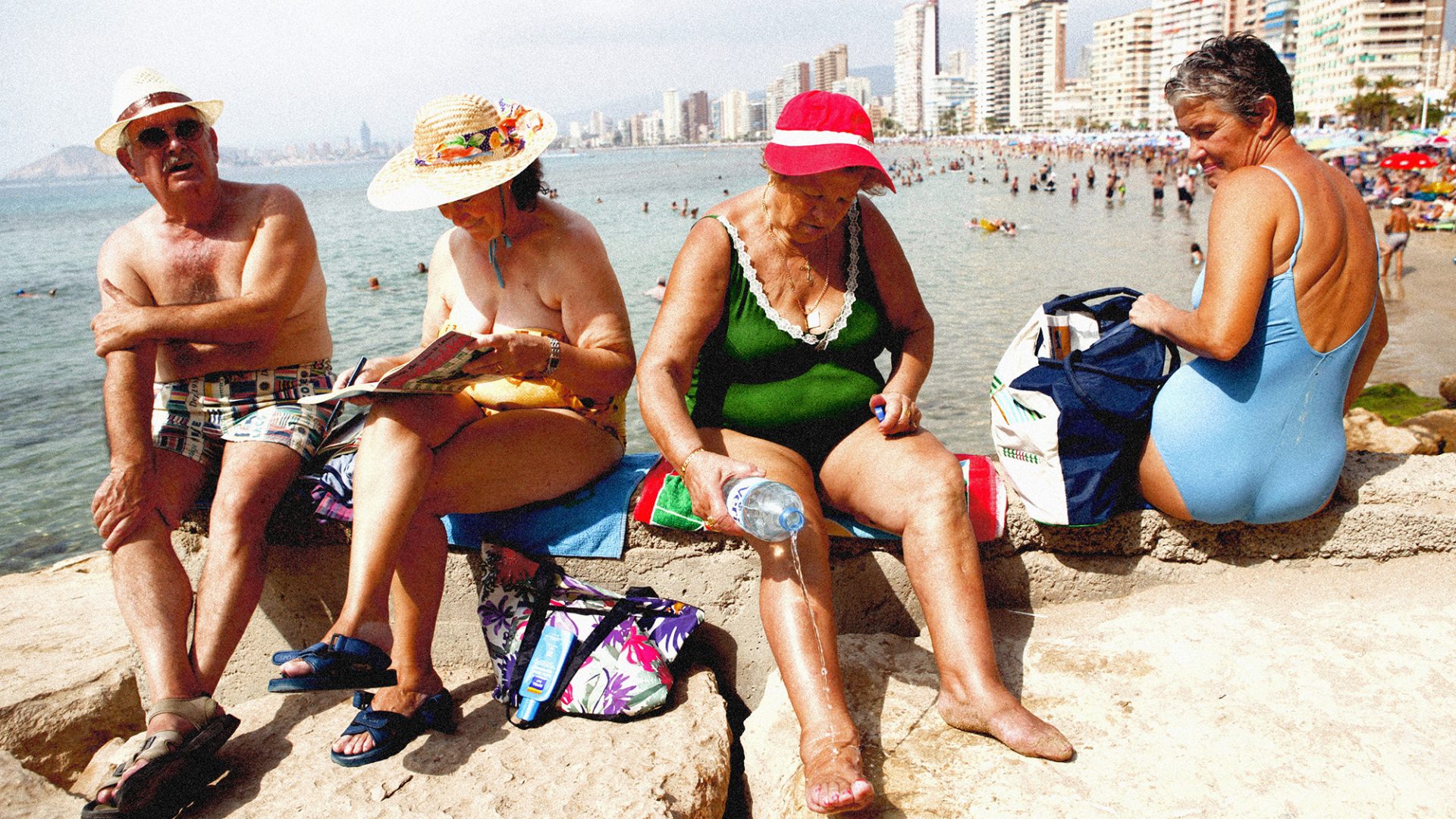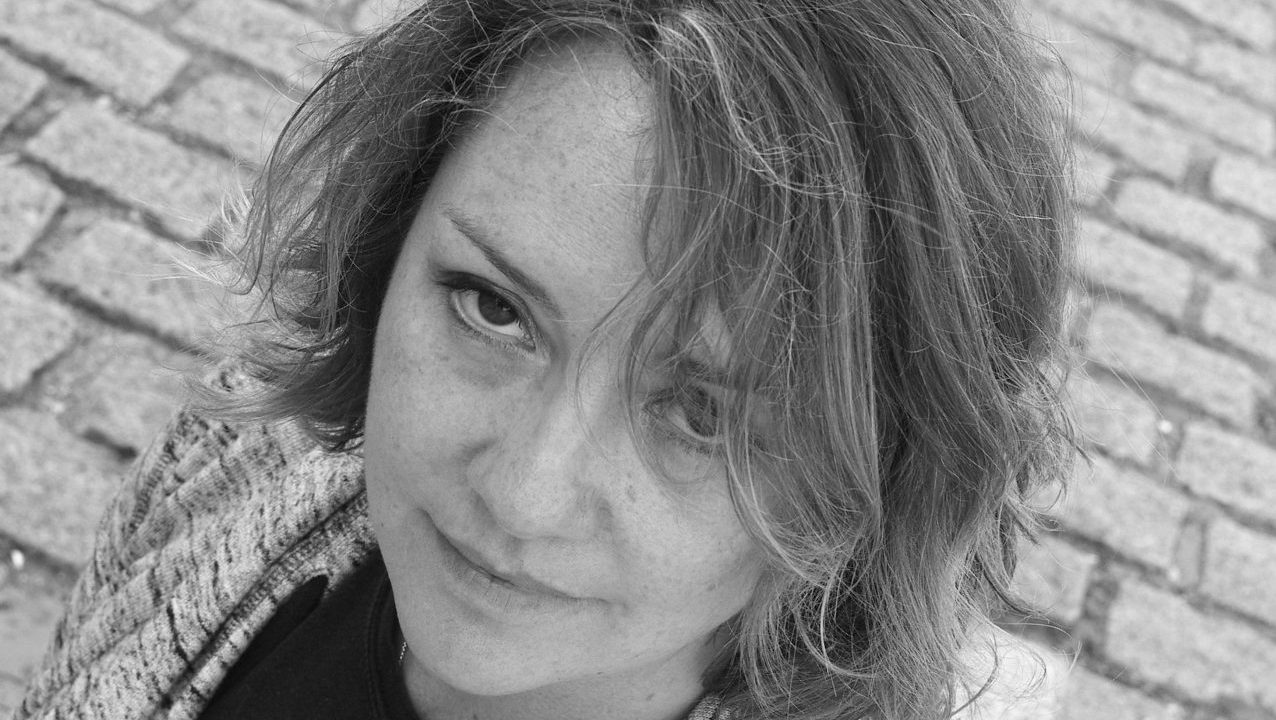As you approach Benidorm from the motorway, a glassy-grey skyline glints in the distance. Hotels and skyscrapers jut from the landscape, appearing and disappearing behind the hills.
Benidorm doesn’t have the off-white and terracotta terraces common to more traditional Spanish cityscapes. Another typically Spanish thing it doesn’t have? Anti-tourism protests.
Around the rest of Spain, however, 2024 was a year of anti-tourism protests, whether it be Valencia, Málaga, Barcelona, Granada, Seville, the Canary or Balearic Islands. But Benidorm, arguably the country’s most famous tourist destination, hasn’t had any protests. That, despite the fact that in 2023 it was the country’s third city in terms of overnight stay volume, behind only Madrid and Barcelona.
Why is that? What does it tell us about post-pandemic tourism in Spain? What, if anything, does it say about Britain and how we project our class prejudices abroad?
Speaking to the New European, former Tourism Minister in the Valencia region, Nuria Montes, explains that “in the big cities where the debate is most heated, the problem is not tourists, but the lack of housing. This country has a problem of access to housing, of prices, of urban planning… this is being transferred to the tourist sector, which is not to blame.” Montes has since been sacked due to a disastrous TV interview in the aftermath of the Valencia floods.
It’s true that the debate has been reductive at times, though perhaps understandably. Anti-tourism has become a rallying call for Spaniards frustrated with wider issues, the lens through which to view structural problems bubbling beneath the surface of Spanish society: rental inflation and a newer, Airbnb-based tourism creeping into inner cities, and its effect on housing stock, integration, and gentrification. It’s hardly a problem that’s going to go away, either: Spain is forecast to welcome 90 million tourists next year.
The more eccentric demonstrations (locals in Barcelona spraying tourists with water pistols, notably) have drawn accusations of xenophobia and turismofobia. Anti-tourist graffiti is now commonplace, as are references to guiris, a gently pejorative term for pasty northern Europeans. Montes feels there haven’t been protests in Benidorm because “neither the Comunitat Valenciana nor Benidorm has a problem of turismofobia… This is a debate launched from political positions that have much more to do with xenophobic ideas than with real problems,” she adds. This is a common counterargument and a somewhat counterintuitive one, the right accusing the left of xenophobia in this way. However, it’s difficult to brand as xenophobic an entire movement that includes many foreigners, and a common placard at protests has been: “Tourists out, refugees welcome”.
Montes herself is from Spain’s centre right Partido Popular. Her family ran a lift-installation company that prospered during the hotel boom of the 1970s, and she was general secretary of Valencia’s hoteliers’ association. “Who hasn’t gone on a trip in the last few months or is thinking of doing so in the coming months?” she asks. This is a fair point, and probably the movement’s most glaring contradiction. Do none of these protesters take holidays? Do they not stay in accommodation that drives up local prices?
Manolo, a jolly and impossibly tanned Benidormense in his 70s, makes his way down the strip. He passes the White Lion, the Guinness bar. There are adverts for sex shows, palm trees and Union flags, Yorkshire and Scouse accents scattered among the Spanish. It’s an overcast, muggy morning and the sun throbs through the clouds. A few tentative swimmers test the water, the beach deserted. Manolo stops in an alleyway between bars and apartment blocks. He hasn’t heard much about the protests, nor does he understand them. “If it wasn’t for English and foreign tourism,” he says, “Benidorm would die.”
Before the tourism boom, Benidorm was a tiny fishing town with small-scale agricultural businesses. “All this was carob trees, orange trees… it was all crops before,” he says, nodding towards the ugly tower blocks standing over us. “I like it here. There’s atmosphere,” he adds, but when pressed he concedes that some of his neighbours don’t agree because tourists “shout at night, break glasses and bottles…” He pauses. “But that generates millions of euros.”


Pedro, owner of a bar a couple of streets back from the beach, watches over his staff. A table of women arrive and order frosty pints and fry-up breakfasts. A waiter switches between native English and fluent Spanish. Sky Sports News hums along in the background. Pedro thinks there haven’t been protests in Benidorm because so many people depend on it: “Let’s say that 70% [of us here], we live on tourism. And in other cities, no.” Like Montes, he feels that the protests are really about “housing, above all tourist flats in the cities.”
He understands. In fact Pedro would have protested himself if he lived in a building “where they put tourists every week. That’s why there are hotels,” he says, “that’s the difference.” He says there’s very little interaction between Benidorm’s old and new town. “From there to there,” he says, pointing, “English zone… ‘Guiri zone’, and from there to the centre it’s more Spanish.” Yet perhaps it’s exactly because of that separation (old versus new, hotels versus tourist flats) that tourism is generally perceived as a public good here. Locals of all ages, when stopped, agree that tourism is a benefit despite the occasional bad behaviour.
In Spanish cities, however, it’s seen as something parasitic, sucking blood from the city. This is most obvious in the housing market. The number of holiday flats has exploded in Spain, particularly in the post-pandemic period. Estimates suggest there are now 340,000, though scores operate illegally so it’s impossible to say. Tourist flats remove stock from the market and inflate the price of what’s left – many cities have seen 100% price rises over the last decade, and survey data shows Spaniards now spend 43% of their salary on rent.
Not only that, but their spread into residential neighbourhoods gentrifies and dilutes the very culture tourists believe they’re coming to experience. As hipster vintage stores and co-working hubs open, local bars, butchers and bakeries pull down their shutters for the final time. One consumes the other, hollowing out cities and leaving behind generic destinations awash with brands and businesses that can be found anywhere.
Benidorm, on the other hand, long-established and comfortable in its own skin, knows exactly what it is. With decades of mass-tourism experience under its belt, it had no post-pandemic identity crisis and is designed to withstand mass tourism in a way Spain’s major cities aren’t. Montes puts this down to the city’s “urban planning, services and organisation” being “designed, planned and organised by and for tourism”.
Perhaps, then, Benidorm represents an older tourism model: coastal, isolated in specific resorts, largely hotel-based, whereas the newer, post-pandemic Airbnb model, more urban and invasive, is something else. Whatever you think of Benidorm, which is better for Spain in the long run? A separate, revenue-generating part of town where people sometimes get drunk and break glasses, or an inflationary, gentrifying model that forces locals from their neighbourhoods and fills it with Airbnbs in what were once family homes? Which, really, is more detrimental to Spanish culture and society?
Up in the old town, things feel more traditionally Spanish. There are tapas bars and seafood restaurants tucked away in the narrow streets, greengrocers and lottery stalls, a table of pensioners sitting around chatting and smoking on the terraces. Inside, the bar is empty. A waitress bustles over. When asked about the protests, she shakes her head and exclaims: “Why don’t they want tourism? We live on tourism. Not only Spain, not only Benidorm, the whole world has been made by tourism. It goes to a country… and the country progresses.”
Her colleague arrives and nods sullenly in the direction of the old boys outside. “I prefer foreigners because they bring more money, eat faster, and don’t complain so much,” she says. They explain they had a bar in a Spanish neighbourhood but were forced to close: “It’s not worth having a business open when they order a coffee and an hour goes by…” says one.
Back on the strip, the coast curves into the distance, skyscrapers looming. A zombie-like stag-do staggers along. An elderly Scouse couple bicker as they roll by on a tandem mobility scooter.
Known as the “Manhattan of the Mediterranean”, Benidorm has the second most skyscrapers per capita in the world after New York. Many of these are hotels. Whereas the Airbnb model swallows up residential housing, Benidorm’s tourists are still largely housed in hotels. Montes notes that “Benidorm’s model continues to be fundamentally hotel-based. The majority of tourists occupy the 42,000 hotel beds available.” This isn’t the case in Spanish cities. Not only has the number of Airbnbs rocketed, but the pandemic sparked a restructuring of the hotel sector, with 700 “lower-category” establishments (three-star and below) closing between 2019 and 2023. This while the number of luxury hotels increased, so they’re not only more scarce than they used to be, they’re more expensive too – €162 per night on average in 2024.
This is a model that works for everyone except locals. In exactly the same self-interested way that Spanish landlords can earn in a week from an Airbnb what they would be renting to a Spanish family for a month, why would tourists opt for increasingly expensive hotels when they can find holiday flats for less?
The obvious solution would be to build more affordable hotels. Yes, Benidorm’s skyline isn’t distinctly Spanish, and many of the skyscrapers are real eyesores, but the model is better for locals and also the environment. For all the fashionable talk of sustainable eco-tourism, Benidorm’s high-rise design makes it one the world’s most water-efficient cities, described even as “the most efficient municipality in Europe” by Jorge Olcina Cantos, president of the Spanish Geography Association. Benidorm was recently awarded the European Green Pioneer Award for Smart Tourism 2025, a prize sponsored by the European Commission for “integrating environmental conservation, economic stability, and social enrichment into its tourism strategy. Perhaps the eco-tourists should, by their own logic, come to Benidorm.
There are economic benefits, too. In 2023 Benidorm alone contributed 1.1% of regional GDP, and as many locals say, Benidorm’s economy depends on tourism. “We found that out during Covid,” one barman says, when it became a “ghost town”. It has the lowest unemployment rate among towns of over 40,000 in the region, though jobs in tourism can come with poor pay and conditions.
These are inconvenient truths for the caricatures of Benidorm we have back in Britain. But then the Costa Blanca resort has long existed as a snobbish shorthand for holidays (and people) the middle-classes disapprove of. In one bar lined with English football scarves and two-euro pint offers, a waitress describes how, “when I first moved here, my ex said ‘please don’t tell people you’re coming to Benidorm’, please just say that you’re moving to Spain. He’s a snob anyway,” she adds, “and so am I sometimes.”
This is true, of course. For those raised in Britain, there’s a snob dormant within us all, waiting for an opportunity to look down on someone else. Holidays are one of the easiest ways to do it. Several tourists interviewed expressed disdain towards holidaymakers in Marbella or Mallorca looking down on Benidorm, for example, but some then themselves sneered at Magaluf, so to assume that one group of people uniformly love Benidorm or anywhere else is in itself a form of internalised prejudice. Many of the people booking Airbnbs in Spanish cities will be from working-class backgrounds. How many middle-class tourists come to Benidorm is less clear.
“The only people who complain about Benidorm are the ones who have never been,” the waitress adds. “People look down on it, they think it’s the kiss me quick and handkerchief and bargain-loving Brits.” Montes notes that “people who speak disparagingly about Benidorm are unlikely to know or have stayed at the five-star Asia Gardens Hotel, voted as the best hotel in Spain… That’s why it’s a mistake to stick to a cliche.”
Are parts of Benidorm tacky? Yes, undeniably. Do some people there live up to the “Brits abroad” stereotype? They do. Is it to everyone’s taste? No, of course not. But it doesn’t have to be, and the idea that British louts are imposing pint-fuelled punch-ups on a local population held hostage across the entire town is simply wrong. The idea that only Britons go to Benidorm, too, is something that exists only in the imagination of middle-class Britain. When this writer’s Colombian brother-in-law was recently planning a stag do, Benidorm was top of the list of possible destinations. Among Spaniards, too, it’s not uncommon to go to Benidorm for a beach break. “More than one million Spanish tourists stayed in hotels in Benidorm in 2023,” Montes notes. Among natives, Benidorm produces none of the lip-curling class resentment it does back in Britain among people who’ve never been.
So, where does holiday snobbery come from? Writing in the Journal of Tourism Consumption and Practice, Dr Mark E Casey has suggested that middle-class perceptions of Benidorm “can be theorised as ‘anti-tourist’, based on strategies where social capital can be acquired and maintained, remaining as a marker of distinction from the mass working-class tourist.” Drawing on analysis of the TV sitcom Benidorm (something that has surely contributed to stereotyping), he argues that by “distancing her/himself from mass tourism, the middle-class tourist is able to make claims to the ‘good tourist’ identity, drawing upon her/his cultural capital to showcase that s/he is culturally aware and sensitive, confident to judge what behaviour is appropriate.”
But what is a “good” tourist in the 2020s? And are city break tourists really as self-aware and culturally sensitive as they’d like to believe? Sneer though people may at cheap and cheerful package holidays, tourists staying in inner-city Airbnbs are contributing to the degradation of the very cultural capital they seek out. Say what you want about the place, people in Benidorm don’t do that. And are the common criticisms – the drinking, the monolingualism, the alleged non-engagement with culture – really so different to more middle-class “breaks” (not holidays!) in Tuscany or Provence or wherever else? Do they not also get drunk, but with cheap wine instead of cheap lager? Do some not stay where other tourists stay? Do they not travel in groups? Do they not speak English among themselves?
Yet certain destinations carry more cultural baggage than others. When going off to university years ago, this writer was embarrassed to admit that his friends and family holidayed in Tenerife and Mallorca, or that he’d gone to Ayia Napa instead of doing a ski season. He still, despite having lived in Spain for years, hesitates in some social circles to mention his time in Alicante, but proudly brags of his years in cultural Seville and Valencia. He shouldn’t. This isn’t the mid-19th century when only the wealthy went on grand tours of Europe. Scoff all you want at fun-in-the-sun resorts, the postwar tourism boom democratised travel. Montes says: “Tourism is the great social conquest of our generation and Benidorm is very clear about that. It is a tourist destination that’s very clear about its vocation and organisation so all visitors feel welcome.” Whether it be where our friends and family go, strangers on social media, or even other tourists we come across abroad, holidays set our subconscious spinning with silent class calculations. We can all be guilty of this, regardless of where we’re going, regardless of where we’re from, regardless of our class background.
It’s because nobody is really a tourist in their own mind. What we think of other people’s holidays reflects more about ourselves than anything else, and is often rooted in caricatures simultaneously born from and feeding our internal biases. Judging travel is one of the social markers (like names or accents or vocabulary) through which we define our place in the mass; it’s also, in some way, incredibly British – a projection of the class system abroad, beyond its shores. Perhaps Evelyn Waugh put it best: “We are travellers and cosmopolitans; the tourist is the other fellow.”
So next time you belittle a place like Benidorm, ask yourself: “is where I holiday really any better?” The chances are, it’s probably less cultured, and worse for local people than you’d like to admit.



